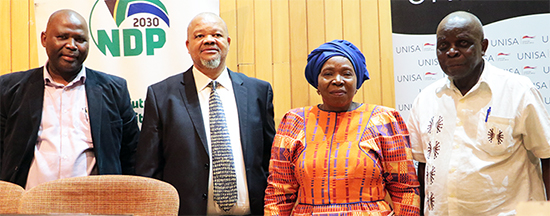Leading change
Minister calls for skills revolution
All of us have a role, individually and collectively, in ensuring that radical socio-economic transformation takes place, said Dr Nkosazana Dlamini Zuma, delivering the fourth National Development Plan (NDP) Public Lecture at Unisa on 4 October 2018.

Dr Somadoda Fikeni (Director: VC Projects and Advisor to the Principal), Prof Mandla Makhanya (Principal and VC), Dr Nkosazana Dlamini Zuma (Minister in the Presidency for the National Planning Commission for Policy and Evaluation), and Prof Harry Nengwekhulu (Director: School of Governance)
The Minister in the Presidency for the National Planning Commission for Policy and Evaluation declared that that the country could not reach its full potential if it did not use every talent and develop the requisite skills. This skills revolution required a partnership between an active citizenry and an accountable public service. We need to educate our people in order for them to be not only be skilled job seekers, but job creators and innovators.
“Essentially,” she said, “radical socio economic transformation is about changing the structure, systems, institutions, patterns of ownership, management, and control of the economy in favour of the poor, the majority of whom are black, particularly African, and female.
An unequal and divided society
Such transformation is necessary because we still live in an unequal and divided society. This is despite having recorded progress in key areas such as education, electrification, the comprehensive social security system, reduced infant and maternal mortality, and increased life expectancy.
Areas where we have not done well, she said, include the high rate of unemployment, inequality of wealth, consumption inequality, wage inequality, and low intergenerational mobility.
According to the minister, the pursuance of the radical socio economic transformation agenda flows from the character of the strategic choices that South Africa as a developmental state has opted for. “That agenda has as its pillars agriculture, industrialisation, infrastructure, tourism, the fourth industrial revolution, services sector, creative economy, gender equality, and youth participation.” ICT, she insisted, should crosscut all sectors.
Dlamini Zuma said that the slow implementation of broadband rollout, high port tariffs, and the cost of data were the biggest barriers to that agenda.
She issued a challenge to the higher education sector: Are we as academic institutions training students for that fourth industrial revolution?
Ticking time bomb that is youth frustration
In his opening address, Professor Mandla Makhanya, Principal and Vice-Chancellor picked up on many of the same preoccupations as the minister. He said that the NDP offered a holistic, comprehensive roadmap for inclusive development and prosperity and laid the groundwork for individual and collective action and ownership of our common future and our common prosperity. This led him to query what was diverting the country from ensuring its full actioning and implementation.
The VC noted that youth and ICT were singled out as major catalysts for galvanising economic growth in NDP 2030. He pointed out that while the youth was the major component of the business of the university sector, particularly in an open, distance, and e-learning (ODeL) institution such as Unisa, ICTs were pivotal in preparing students for the 21st century. “What concrete measures are we implementing to ensure that we can make our own contribution to the realisation of these critical developmental pillars and to alleviate the pressure of the ticking time bomb that is youth frustration in our country?”
The VC emphasised that the NDP placed a focus on youth development and the role of women. “If we don’t register progress in our implementation of the NDP, we are in reality failing these most vulnerable of our citizens and jeopardising our very future.”
A lively question-and-answer session ensued, with programme director Dr Somadoda Fikeni, Director of VC Projects and Advisor to the Principal, chairing the debate. Professor Gugu Moche, Vice-Principal of Teaching, Learning, Community Engagement, and Student Support, delivered the vote of thanks that concluded the lecture.
*By Sharon Farrell
Publish date: 2018/10/08